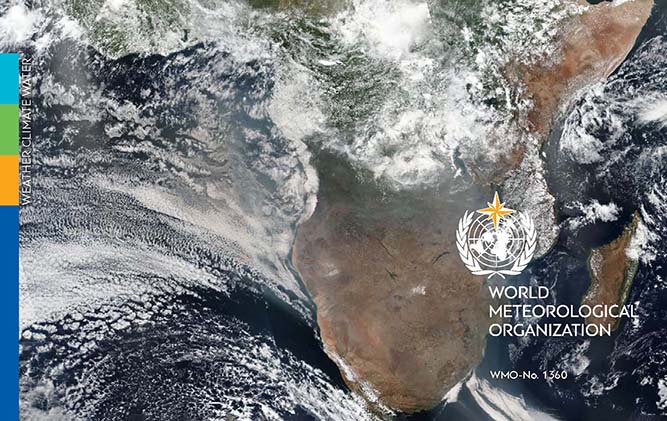Our Terms & Conditions | Our Privacy Policy
Africa climate report a useful policy tool as COP29 approaches
AFRICA
The latest State of the Climate in Africa report, which provides an overview of the extent of the climate crisis facing the African continent, is expected to serve as a vital tool for policy-makers, in particular ahead of COP29, which will take place in November in Baku, Azerbaijan.
The 2023 report was compiled by the World Meteorological Organization (WMO), and was released earlier in September by the WMO, the African Union Commission, the UN Economic Commission for Africa (UNECA) and the African Ministerial Conference on Meteorology.
It reiterates that Africa bears an exceptionally heavy burden because of climate change and disproportionately high costs for essential climate adaptation. For instance, African countries are facing an escalating climate change bill, with an average loss of 2%-5% of gross domestic product (GDP) due to climate extremes and the cost of adaptation is estimated to be between US$30 billion and US$50 billion annually over the next decade, representing 2%-3% of the region’s GDP.
According to Dr Stephan Steyn, a researcher and lecturer of agrometeorology in the department of soil, crop and climate sciences at the University of the Free State, South Africa, the report is crucial for African countries as it provides comprehensive statistics and insights on climate patterns, and highlights the vulnerability of the continent to extreme weather events such as droughts, floods and heatwaves.
“By showcasing the climate risks that threaten key sectors such as agriculture, water resources and health, the report serves as an authoritative guide for African governments to prioritise climate adaptation strategies and secure international climate financing,” he said.
He underscored that, on global platforms like the upcoming COP29, the report’s findings could be instrumental in advocating for Africa’s specific needs in the face of climate change.
COP29 negotiations
Nigerian researcher, Dr Adeyemi Isaiah Adeyemo from the department of biological sciences at Olusegun Agagu University of Science and Technology, Ondo State, Nigeria, agrees with Steyn about the value of the data for climate experts, policy-makers and communities.
Adeyemo also highlighted that the report can be shared on global platforms during meetings at windows of opportunities such as the upcoming Conference of the Parties (COP29), where world leaders and relevant stakeholders gather to discuss climate change and map the way forward.
According to Joalane Marunye, a researcher and lecturer in the department of geography and environmental science at the National University of Lesotho, the report is a confirmation of climate challenges facing the region and is also a compilation of evidence that opens up opportunities for collaborations and partnerships among African institutions to address challenges indicated in the report.
“The WMO State of the Climate Report will assist Africa’s group in the negotiations (during COP29) as it provides comprehensive, data-driven insights into the continent’s current climate challenges,” she said.
Researchers as climate ambassadors
Steyn also added that universities and researchers across the region had a pivotal role in addressing the challenges outlined in the report. Their involvement was critical in improving climate modelling, identifying developing problems, developing innovative solutions for adaptation and enhancing the precision of early-warning systems.
“Academia can contribute to climate education, raise public awareness and foster international collaboration (between African countries and further abroad) to share knowledge and resources in addressing these climate challenges.
“The UFS has also recently rolled out a structured MSc in climate change to address the growing need for professionals that are knowledgeable in climate change and variability,” he said.
Adeyemo emphasised the role of advocacy within universities to promulgate and enforce rules against dangerous climatic activities within communities.
Armed with information provided through such reports, higher education institutions could build awareness campaigns targeted at strengthening the resilience of communities and cities to withstand extreme climate events and to establish green environmental and climate clubs to promote environmental awareness.
“Researchers must serve as climate ambassadors in schools and communities and engage government for funding of various climate-enhancing activities … researchers must be at the forefront of the dissemination of education, information and communication materials into local climate issues developed for specialists and non-specialist audiences,” he said.
Extreme events impacting universities
African universities have not been spared from the extreme events affecting its countries, for example, Southern African institutions have been severely affected by extreme climate events, including severe heatwaves and devastating floods.
The University of KwaZulu-Natal in South Africa is one of many institutions that experienced damage to property and infrastructure due to flooding events in 2022.
Located in the southern part of the continent, Lesotho has been affected by severe heatwaves and droughts, forcing some universities to the verge of closing due to lack of access to water on campus.
Incidents of extreme storms have also led to destruction of property and campus buildings, making more institutions vulnerable to climate change impacts.
In Nigeria, flooding and extreme heatwaves have been disrupting both institutional and economic activities such as agriculture.
Said Adeyemo: “As environmental biologists, we are seeing certain flora and fauna becoming extinct or endangered because of the changes in climate. In response to the changes, the university and department have gardens where we are cultivating and protecting these endangered species. However, due to paucity of funds and personnel, several other species – known and unknown – are fast disappearing from the wild beyond the reach of the gardens,” he stated.
Images are for reference only.Images and contents gathered automatic from google or 3rd party sources.All rights on the images and contents are with their legal original owners.



Comments are closed.